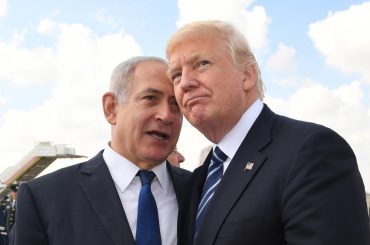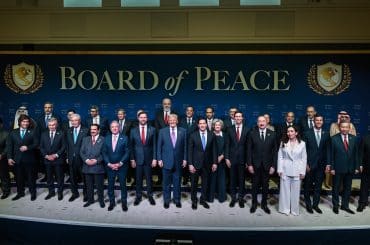Should another war break out between Israel and Lebanon, who would be at fault: the nation that actually commences bombing and invasion, backed by the full diplomatic and military support of the most powerful country in the world? Or the country that is bombed and invaded, along with its quasi-ally that provides a small fraction of such assistance?
An article in Wednesday’s Times answers that question in typical fashion. The guilty party would be Lebanon’s Iranian-backed Hezbollah party, and its main offense would be Hezbollah’s supposedly provocative preparation of a Lebanese defense to an Israeli attack. The article, authored by Thanassis Cambanis, is written as if the reporter were “embedded” with the Israeli Ministry of Foreign Affairs.
In July, 2006, Israel launched a bombing campaign and invasion against Lebanon that caused widespread destruction and loss of life similar in scale to its subsequent attack on Gaza. More than 1000 Lebanese lost their lives and whole villages and neighborhoods were destroyed. Yet many Israelis considered the “war” a failure, since Hezbollah not only survived the conflict but also inflicted enough damage on the invading Israeli Army and on communities in northern Israel to force withdrawal before Israel had accomplished its objective, presumably the destruction of Hezbollah. Since then, many Israelis have been itching to resume the fight, just as they were for six war-free years after Israel finally ended its two-decade long occupation of southern Lebanon in 2000.
Now, the Times reports that Hezbollah is provoking the Israelis by preparing for the possibility, or likelihood, of the next Israeli war. It is precisely this defensive buildup that Israel is using as a potential casus belli to justify a new war.
Amazingly, the argument that a military attack is necessary to defeat those who are preparing to defend themselves from that military attack is not dismissed as a transparent absurdity. (In fact, it is the general assumption underlying all the war talk about Iran as well.)
From the very start, Cambanis uses loaded language to convey his message. “Hezbollah instigated its war with Israel in 2006.” It is true that a border raid on an IDF position was the catalyst for the Israeli attack, but the word “instigate” implies that Hezbollah intentionally provoked the “war.” Israel’s war preparations already were in full swing, and the decision to respond with a full-scale bombing and ground invasion was purely Israel’s.
Subsequently, Hezbollah chief Nasrallah has claimed, quite credibly, that he would not have launched this border operation had he known the Israelis would use it as an excuse to retaliate so destructively. Saying that Hezbollah “instigated its war” is similar to saying that Herschel Grynszpan “instigated” Kristallnacht, or that Princip & co. “instigated” World War I.
Similarly, Hezbollah is cast as the aggressor in the next war: “Hezbollah appears to be, if not bristling for a fight with Israel, then coolly prepared for one. It seems to be calculating either that an aggressive military posture might deter another war, as its own officials and Lebanese analysts say, or that a conflict, should it come, would on balance fortify its domestic political standing.”
In other words, while Hezbollah may say that its arms buildup is for deterrent purposes, Times reporter Cambanis knows better, and suspects that Hezbollah actually hopes to provoke a war for craven political purposes.
And wait. Let’s not depict Hezbollah as the sole villain here, when we can blame Iran as well. The Times: “because of the party’s ties to Iran and its powerful militia, Hezbollah officials say they are ready to fight even if a war would do widespread damage.”
In addition to implicating bete noire Iran, the article suggests that Hezbollah’s vow to resist a foreign military invasion is responsible for the destruction Israel would wreak; if only Hezbollah declared it was unwilling to repel an Israeli attack, the danger of “widespread damage” would dissipate.
Continuing with the Iranian theme: Hezbollah is “emboldened” because its “patrons in Iran appear to have regained control” after post-election challenges to its authority. The article also lays the groundwork for Israel’s inevitable wholesale attacks on civilian areas that characterized its previous attacks on Lebanon and Gaza:
“Hezbollah appears to have retained the support of the Shiite Muslims in southern Lebanon. ‘Hezbollah is not a foreign body. It is an organic, natural part of every house, village,’ said Hussein Rumeiti, an official in Burj Qalaouay.”
The message is clear: If Israel should again decimate entire villages and neighborhoods, we should not weep for the civilians killed in the rubble. They are inextricably intertwined with Hezbollah and therefore appropriate targets for Israeli attack.
In reality, Israel will bomb and invade Lebanon if it feels like it. As in 2006 and 2008-2009, its indiscriminate death machine will receive the full backing of its American sponsors, regardless of who is the dog and who is the tail. Israel requires no provocation by Hezbollah, and if ready to go, it will invent an excuse, or magnify a relatively minor incident.
In 1982, Israel’s pretext was the assassination attempt on its ambassador in London, and in 2006, it was the border raid. For the next round, it appears to be Hezbollah’s stockpiling of missiles to use in case of an Israeli attack that perversely justifies that attack, and don’t forget Iran pulling the strings behind the scene.
The Times article does not mean war is inevitable, but it does construct a framework to justify military action by Israel. Does the Israeli government bestow honors upon foreign reporters? If so, Thanassis Cambanis deserves top awards.

